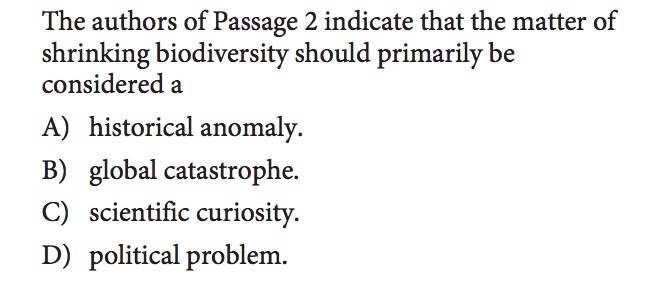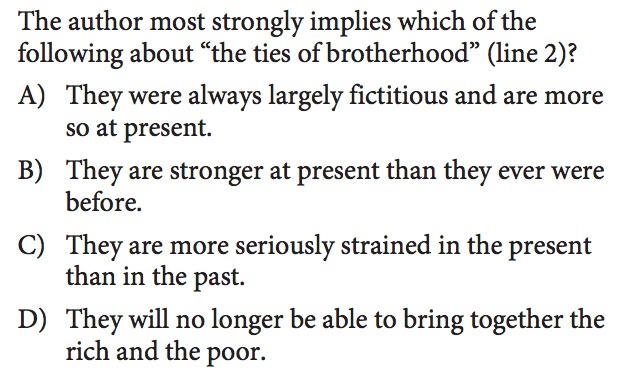The SAT and the ACT are not designed to be fun tests. That’s probably really obvious to you already! These tests takes forever, have a billion questions, and will turn...
Common Wrong Answer Choices on the SAT and ACT Reading
Many to-be ACT and SAT takers absolutely dread the Reading section for a series of totally fair reasons. The passages can be mind-numbingly boring. Questions about tone and author’s purpose seem cruelly subjective. So many of the questions have various answer choices that seem fine.
The fact of the matter is that Reading sections on standardized tests tend to be more intimidating than they are legitimately difficult. Sure, the people who write these tests design the Reading section to be dry, but they also write questions and answer choices following some easily identifiable tropes and patterns. Oh, by the way, real people write these exams!
There are only so many tricks that test writers have available when coming up with incorrect answer choices. This guide will help you identify the answer choices you should be suspicious of, helping you feel more in control when confronting an unfamiliar reading passage.
But First: Why Identify Common Wrong Answer Choices?
Many test takers tend to approach the reading comprehension questions on a standardized test the same as they would ordering lunch. They read through all of the whole menu of options for each question and then choose the one that seems most appealing.
The people who write these tests hope that’s exactly what someone taking the test will do. A big part of their game is providing test takers with a number of answer choices that look appealing on first glance.
Basically, the people who write these tests are banking on the fact that you know the clock is ticking and you have to choose whatever you think is the best choice fast enough in order to get a shot at the remaining questions.
Identifying common wrong answer choices is a great way to beat these standardized tests at their own games. Sometimes, this will help you choose between two answer choices that look equally appealing. Sometimes, it will help you make snap judgements on a question you find really difficult, and therefore help you increase your chance of guessing correctly by eliminating an answer choice you know likely isn’t correct.
Identifying common wrong answer choices helps a lot as part of a good process of elimination strategy.
Common Wrong Answer Choices, Explained
Too extreme: This can apply to questions asking you to describe characters in a story or ones asking you to draw conclusions about a study described in an expository passage. Take answer choice B in this problem:

Scary things come to mind when you hear global catastrophe. Always ask yourself if it’s easier to support the more extreme answer choice or the less extreme one. Here we also have answer choice D, which reads political problem. A more extreme — and therefore harder to prove — statement is not as good of an answer as an equally accurate and more flexible one.
Generalizations: Similarly, beware of answer choices that allow for too much interpretation. You will need to choose an answer that is reasonably specific. Answer choice A from this question is a good example of such a generalization:

The phrase “always largely fictitious” sticks out like a sore thumb. Always is in and of itself a generalization and you want to be wary of any answer choice that starts that way. Always is hard to support unless explicitly stated in the page. Even worse, though, is this part of the phrase largely fictitious. What does that even mean? Is it totally fictitious or largely, but not entirely, fictitious? How could something be always mostly but not entirely fictitious?
Half right means all wrong: Watch out for answer choices that contain some valid information alongside something that doesn’t really match the passage. These tend to be the most tempting wrong answer choices, since they look appealing when you’re just trying to pick something and move on.
This is a hard one to provide an example question for since you really need the context of the passage. But remember, if just part of an answer choice can be supported by the passage, it should always be tossed out in favor of an answer choice that can be entirely supported by a passage. The better answer choice should be the one that’s hardest to eliminate.
Off-topic: Sometimes an answer is bad because it really has nothing to do with the question being asked or the information in the passage. Looking for this type of common wrong answer choice can prove helpful on science-oriented passages, where lots of jargon and unfamiliar science concepts make things confusing. Consider this one:

The question asks about small comets, but answer choice A talks about the sun and electricity. It doesn’t make any sense that electricity or the sun would have anything to do with comets, so you can just eliminate that one.
Definition is too literal: This one will either apply to vocabulary in context questions or to ones asking what a phrase means. Take this question:

Without having read the passage, the most alluring answer is B, since a movie projected in a dark theater is “a show in light.” That’s why this answer choice is here! It doesn’t actually make sense given the passage, but if you skimmed or didn’t really understand what happened in the story then it might make some sort of sense to you. Avoid answer choices that define a word or phrase too literally without any support from the passage.
Conclusion
Being able to identify common wrong answer choices is an important part of your overall test taking strategy. This skill will improve your time, your accuracy, and lessen stress. When you're able to glance at previously confusing and distracting answers and identify them as incorrect right away, that's one less obstacle to overcome on your way to a fantastic SAT and/or ACT score.
About the Author
Mike S. is one of our most experienced test prep tutors. Click below for more information on our SAT/ACT test prep packages:
